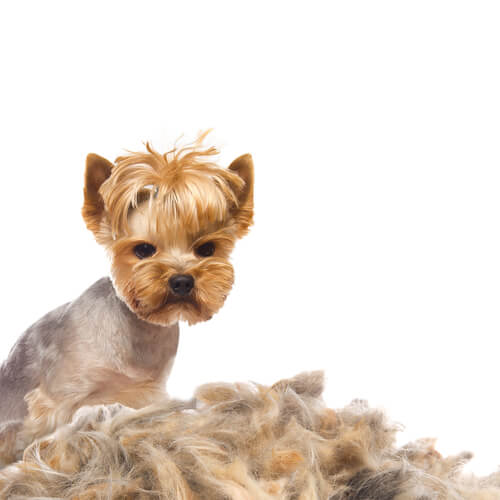Hair Loss in Dogs: Causes and Treatments

Who hasn’t had to sweep or vacuum the house two, three, maybe four times a day when the dog is shedding changing their coat. Hair loss in dogs is very common. However, it’s important to be certain about what are the causes in order to act promptly if it’s a serious problem.
Hair loss in dogs becomes a problem when it becomes excessive and skin is exposed. The reason might be anything, from a skin condition to stress. Read this article to learn how to come up with a possible diagnosis, reviewing the causes, treatments, and preventative measures, before you take your dog to the vet.
Most common causes of hair loss in dogs and their treatments
Just like people, a dog’s hair can be evidence of a range of conditions. It’s not just scabies or dermatitis that cause canine alopecia. A poor diet can also make your dog’s hair weak and fall out continuously. In any case, treatment may include anything from medication to walks in the sun.
1. Poor diet
Cause: When feeding your dog, you need to make sure that he gets the nutrients that are necessary for their age and size. You might sometimes need extra sources of food, like bones or boiled rice.

Treatment: It’s quite simple because you will need is to change their diet and you’ll notice the improvement in a matter of no time.
2. Allergies
Causes: Dogs can also have several allergies which may appear on the skin. Mites, mold, pollen, cleaning products, and certain chemicals can trigger allergies.

The main symptom of an allergy will be itching, which is really uncomfortable for your dog if you don’t get them treated in time. If you find hairless spots, or with swelling with a reddish color, probably it was caused by an allergy.
Treatment: Only your vet is the right person to tell you what would be the right treatment for your dog. However, in general, your dog will need a series of injections until the symptoms go away.
3. Calluses and ulcers
Causes: Areas, where the skin appears to be callused due to a lack of blood flow, are called canker sores or bedsores. They tend to be more common in older dogs due to the aging and wear on areas like their elbows.
Treatment: If the area is bleeding or wounded, you could add some oxygenated water to prevent the wound from getting infected.
Causes and treatments for hair loss in dogs that are linked to complex illnesses
1. Cushing’s Syndrome
Causes: Cushing’s syndrome is caused by a small tumor on the pituitary gland. This means that the body produces too much cortisone. As a result, the condition is also known as hyperadrenocorticism. Just like hair loss, this condition causes thinning of the skin, abdominal inflammation, wheezing, decay, and weakness.
Treatment: Because of the complexity of the surgery to remove the tumor, this is generally treated with medication for life.
2. Parasitic infections
Causes: Fleas, ticks, and subcutaneous parasites like scabies are very damaging to the skin and can cause hair loss in dogs. To prevent your dog from getting these parasites in the first place, the best thing you can do for your dog would be providing them with a good diet and special shampoo.
Treatment: Fleas and ticks are easy to treat at home. There are powders and other products that you can apply to your dog’s neck to get rid of fleas. If your dog has scabies, you can use powders and similar products. However, you’ll need special medication depending on what type of scabies it is.
Other causes and remedies for hair loss in dogs
Some dogs have a genetic predisposition for alopecia. Breeds such as the Chihuahua or the Doberman tend to lose hair on the torso, spine, neck, and ears, among other places.
In the hair loss can’t be treated with medication, there are home remedies that can help to slow the rate of hair loss.
Grape seed extract has interesting amounts of antioxidants which are beneficial for the skin. They’re sold in capsules which are available for dogs. Brushing your dog’s hair on a regular basis is something else that can help prevent excessive hair loss.
In summary, the causes of hair loss in dogs can be illnesses, something not that serious or due to organic problems relating to their daily care. In most cases, a visit to the vet can do the trick.
